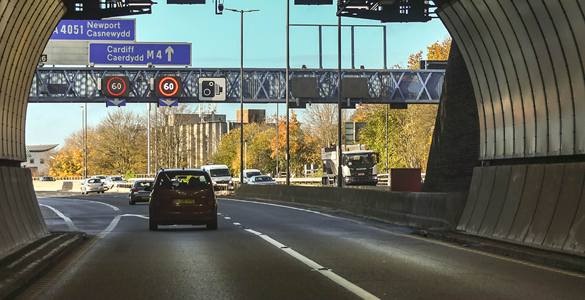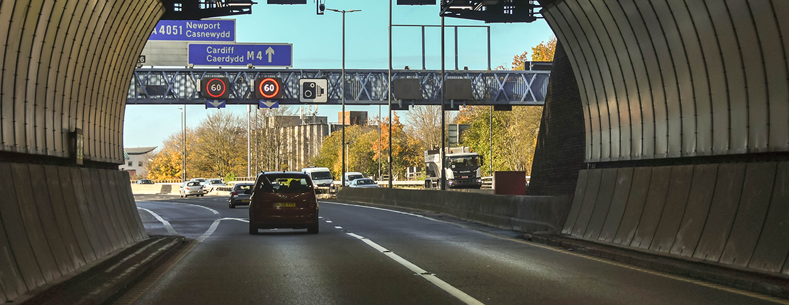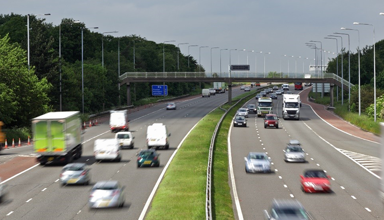On 4 June 2019, the First Minister, Mark Drakeford, announced his long awaited decision on the proposed M4 corridor around Newport scheme. As has been much publicised since, the First Minister has decided not to proceed with the plans.
The decision follows years of debate on how best to tackle congestion on this section of the M4, including a lengthy public inquiry. But what did the Inspector conclude? Why did the First Minister reject the scheme? And what happens now?
The road so far
Plans to address congestion on the M4 around Newport have been debated since the early 1990s when the then Welsh Office first proposed a relief road. The latest proposals (were set out by the Welsh Government in 2014 in M4 Corridor Around Newport – The Plan.
The history of the scheme is set out in our previous blog post.
In late 2018 the Welsh Government stated it would publish the public inquiry Inspector’s report on the scheme and the First Minister’s decision.
It was expected that Carwyn Jones AM, would take this decision before he stepped down as First Minister in December 2018. However delays, attributed by the Welsh Government to the need for legal advice, meant that the decision eventually came in June 2019.
Had the First Minister decided to confirm the statutory Orders, this would have effectively granted planning permission for the project to go ahead, although the Welsh Government had committed to a binding vote by the Assembly on whether to finance the scheme.
Central reservations
In his decision letter, and during his statement in Plenary, the First Minister acknowledges that the inspector recommended that he should make the Schemes and Orders, subject to modifications set out in Section 9.
In fact, the Inspector’s report goes as far as to conclude that:
there is a compelling case for the scheme to be implemented in order to relieve an acute problem on the strategic motorway network...It is accordingly my view that the scheme is in the public interest.
Despite this, the First Minister’s decision letter makes clear that he had two central reservations preventing him from making the Orders –cost and the scheme’s environmental impact.
The First Minister also emphasises that his decision centred on whether to confirm a number of Orders, including Compulsory Purchase Orders (CPOs). Consequently, the letter moves away from discussing the relative advantages and disadvantages of the project. Instead the First Minister concludes that, due to cost and environmental impact:
I do not consider that there is a compelling case in the public interest to expropriate the land that is subject to the CPOs and I do not consider that it would be appropriate or expedient to make the other Schemes and Orders.
Different directions
The First Minister’s decision contrasts with the Inspector’s conclusion that there is a ‘compelling case’ for the scheme. However, where did the Inspector’s conclusions (found on page 484 of his report) differ to those of the First Minister?
Project costs
On the issue of costs, the Inspector determined that:
the current problems on the existing M4 impose an identifiable penalty on the Welsh economy… I conclude that the scheme would offer at least sound value for money and, in all probability, good value for money.
The First Minister does not question the Inspector’s conclusions on value for money. Rather his decision is based upon the ‘the affordability of the project in the context of the Welsh Government’s overall capital budget’.
Announcing his decision in Plenary, the First Minister refers to a Cabinet meeting in April 2019 where the view of Ministers was that the significant expenditure needed to deliver the project ‘would have an unacceptable impact on other priorities’. The First Minister states in his decision letter that due to the costs of the scheme:
there is no prospect of the Project being implemented in the foreseeable future.
It is no surprise that the overall cost of the project has proved to be a roadblock to the scheme proceeding. In 2015, the then First Minister, Carwyn Jones stated the project would cost ‘nowhere near’ £1bn, however by December 2017 Welsh Government cost estimates were over £1.3bn and now some suggest the scheme would cost closer to £2bn.
While the media had previously reported development costs for the scheme as £44m., on 5 June 2019, the Minister for Economy and Transport, Ken Skates, confirmed in a written statement that ‘ £114 million [has been] spent since 2013 developing the proposals for the £1.32Bn (in 2015 prices, which equates to £1.57Bn in 2019 prices) M4 Project’. When questioned on the spend to date, the Minister stated that:
when you compare the proportion of the cost for the development of the M4 against other major road schemes, the development costs as a proportion are actually very favourable—they amount to 6.3 per cent.
Environmental impacts
The scheme’s environmental impact, particularly on the Gwent Levels, is the issue where there is most difference between the Inspector’s conclusions and the First Minister’s decision, which comes only several weeks after the Welsh Government declared a climate emergency in Wales.
The First Minister himself states that:
this is an area where my judgement as to where the balance between the competing interests lies is different to that of the Inspector’s.
Whilst the Inspector acknowledges that the scheme ‘would have a significant detrimental impact’ on the Gwent levels, he concludes that:
the balance falls clearly on the side of constructing the scheme from which so much public benefit would accrue…in my view…the adverse ecological effects of the scheme can be satisfactorily mitigated by the medium term.
In fact, the Inspector goes as far as to praise the steps taken by the Welsh Government itself as ‘extraordinary’ to:
replace the effected land, through the proposed compulsory purchase and conversion of suitable areas and the excavation of new reens and ditches which would more than offset the damage caused by the scheme.
The Inspector’s view that the Welsh Government’s own mitigation proposals would mean that ‘in the medium term the Levels would be larger and ecologically in better condition than they are today’, is significantly different to the view of the First Minister that the scheme would have a ‘permanent, adverse impact’.
The First Minister’s decision letter makes clear that even if the scheme was affordable, he would still block the black route. He states:
I attach greater weight than the Inspector did to the adverse impacts that the Project would have on the environment. In particular, I attach very significant weight to the fact that the Project would have a substantial adverse impact on the Gwent Levels SSSIs.
Road rage or relief at last?
As expected, there has been a mixed reaction to the decision. Whilst CBI Wales has described it as a ‘dark day for the Welsh economy’, Friends of the Earth, who in 2015 were unsuccessful in their legal challengeto the Welsh Government’s proposals, described it as ‘great news for Wales and the planet’. The Future Generations Commissioner has also welcomed what she describes as a ‘brave decision’.
In the chamber, this debate shows no signs of slowing down, with much of the discussion focusing on where we go from here, including the Plaid Cymru ‘Alternatives to the M4 Relief Road’ debate on 12 June 2019.
In announcing his decision, the First Minister also outlined that a new commission of transport experts will be established:
charged with reviewing the evidence and making recommendations to the Welsh Government on alternative solutions to the problems faced at the M4 corridor around Newport.
On 5 June 2019, the Minister for Economy and Transport also issued a written statement on the commission which will ‘report on its interim findings, with recommendations for immediate practical interventions, within six months of its formation’.
A new route or a road already travelled?
The Minister for Economy and Transport has stated that the purpose of the commission is to:
identify deliverable alternatives that offer value for money to the black route scheme that will reduce congestion to a level as close as possible to enable free-flow traffic to take place.
However, some have questioned what different avenues a new commission could explore, given the alternatives already considered by the public inquiry.
As outlined in our previous blog post, a number of alternatives to the black route option have already been considered. In July 2014, the Welsh Government published an appraisal of alternatives considered during the consultation process (PDF 2.39MB) and in March 2017, the Welsh Government published its ‘Objectors’ Suggested Alternatives Report’ (PDF 56.1MB) which considered 22 alternative routes’ put forward by objectors to the scheme during the public inquiry. In total, the Inspector’s report considered 28 suggested alternatives.
Aside from alternative route proposals for a new road, other options previously suggested include investing the funds ear-marked for the project in alternative forms of transport. In September 2018, the Future Generations Commissioner published a report titled ‘Transport Fit for Future Generations’.
The Inspector’s conclusion on the alternative options considered during the inquiry was that:
none of the strategic alternatives advanced by objectors was better than the published scheme. I therefore conclude that…no alternatives need to be considered further by Ministers with the exception of Alternative 11, an additional slip road at Magor Services which has merit.
Alternatives also included the much discussed ‘blue route’, with the Inspector finding a number of options ‘based on the blue route’s concept’ to be ‘severely deficient’.
In his written statement on the commission, the Minister for Economy and Transport also refers to a number of ‘fast-tracked’ interventions planned for the short term. These include additional traffic officers and different arrangements for clearing accidents.
Some have questioned why these measures were not in place already. The Minister for Economy and Transport responded that the measures have been tested on the A55 which:
enables us now to move them out onto the M4, with confidence that they will alleviate congestion.
What impact these measures will have remains to be seen but with the new commission set to issue its interim report in six months’ time, Wales waits to see if there ever will be light at the end of a long road through the Brynglas tunnels.
Article by Francesca Howorth, Senedd Research, National Assembly for Wales






